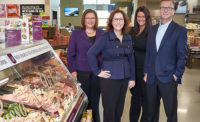Few people today don’t know someone that has developed some form of cancer in their lifetime. Indeed, the greatest battle the human race has ever fought continues — though with some signs of hope over the past few decades.
According to “Cancer Facts & Figures 2016” (published by The American Cancer Society), the five-year relative cancer survival rate for all races and genders was 49 percent in the mid-1970s (1975-1977) — in 2005-2011, that number had improved significantly to 69 percent.
With more people winning the battle against cancer on an individual basis, research has grown to help patients recover. Fighting cancer has become serious business not only for academia and pharmaceutical companies, but also food companies, which have chipped in funding and expertise to help patients battling to get their lives back.
Among those food companies is Austin, Minn., processor Hormel Foods — which has a history of funding cancer research and this year launched its most direct volley in assisting cancer patients: the Hormel Vital Cuisine line of products.
Decades of battle
Hormel Foods drafted itself into the war against cancer in 1942, when then-president Jay Hormel founded the Hormel Institute — a biomedical research center with scientists and collaborators working together to accelerate discoveries leading to improved health, according to the institute’s Web site. The institute is a division of the University of Minnesota and works in partnership with Rochester, Minn.-based Mayo Clinic.
Although the Hormel Institute offers the food company a highly tangible and respectable outlet for its philanthropic efforts, Hormel Foods recently wanted to step up its efforts, says Chet Rao, Ph.D., strategy and business manager for the specialty foods group at Hormel Foods.
“As we are a protein company, [chairman and CEO of Hormel Foods] Jeff Ettinger challenged the team to come up with nutritional solutions for cancer patients and general populations getting older, who need more protein in their diet,” Rao says. “We wanted to find ways to give nutrition solutions to these populations.”
To be clear, Hormel Foods wasn’t planning to just feed its current portfolio into a new brand name and market it to cancer patients — the point from the start was to make the products truly meaningful and responsive to the specific needs of someone undergoing treatment for cancer.
“Whether you’re in outpatient or inpatient therapy, you’re not focused on nutrition; you’re so tired, you don’t have time, and you don’t have energy,” Rao says. “You really have good days and bad days. On good days you can muster enough energy to cook, but on bad days, you just don’t have energy to do anything, let alone cook and eat.”
Thus, Hormel Foods’ team set out to interview cancer patients to find out their nutrition needs and demands in terms of product attributes. Then, after a presentation at the Mayo Clinic in Rochester, Minn., Dr. Paul Limburg, medical director for Mayo Clinic Global Business Solutions, connected the Hormel Foods team with the Cancer Nutrition Consortium (CNC) — a non-profit organization created to raise awareness of the issue of food, taste and nutrition related to cancer treatment in an effort to improve the quality of life of patients.
“The consortium basically had just finished their research of 1,200 cancer patients,” Rao explains. “They were looking at the same thing — how are the patients getting their nutrition? What are the key deficiencies? What are the issues?”
Melissa Bonorden, senior product development scientist for Hormel Foods, says the CNC research confirmed much of what the Hormel Foods team believed based on a few dozen interviews they’d already done.
“Patients wanted a variety of options in their meals. They wanted meat-based dishes. They wanted vegetarian dishes. They needed solutions,” she says. “Some of the symptoms that come with cancer treatment are swelling, pain, fatigue. You’re not able to go shopping the way you would, or you’re not able to stand over a stove. Or sometimes you have sensitivity in your hands and you can’t wash the dishes afterwards.
“[Sometimes] there is a window of opportunity when you’re hungry, you start thinking about a meal, and 30 minutes later when you have that meal prepared, that window may be closed and you may not be hungry. So they were missing opportunities to get important nutrients in on a daily basis,” Bonorden adds.
Armed with that data, the team had its focus for the product line, Rao says, and it revolved around Hormel Foods’ corporate-wide expertise as manufacturers of several different product lines.
“We know nutrition [and calories] and can do that really well; we know protein; and we know hydration through our acquisition of Muscle Milk,” he says.
Early in 2016, the efforts materialized into Hormel Vital Cuisine, backed by the CNC and focused initially on protein shakes and drink powders built off the model set by Hormel Foods’ CytoSport businesses. Then, in May, Hormel Vital Cuisine rolled out three ready-to-serve meals based on the Hormel Compleats line, with nutrition and taste profiles formulated specifically to meet the needs and desires of cancer patients. Development of the formulations, Bonorden says, provided an exciting challenge for the R&D team.
“Comfort food, protein [content] and texture were probably our biggest guiding principles, and it was an opportunity to look at ingredients that we may not typically use. For example, we have quinoa, sweet potatoes, black beans and lentils in these dishes,” she says. “We wanted to work on things that were flavorful but not too spicy, because we knew that [could] cause issues. … We just wanted to make it meaningful, flavorful and protein-focused.”
The battle plan
More varieties of Hormel Vital Cuisine are on the way in October, says Don Kremin, group vice president of the Specialty Foods Group for Hormel Foods, with even more innovation down the road.
“Jeff Ettinger has made this his No. 1 priority within the organization, even with all the acquisitions Hormel Foods has made,” he explains. “So you’ll see further expansion of flavors in the ready-to-eat microwave meals [and] additions to the ready-to-drink product line that we have. And you’ll see collaboration with a number of very, very large retailers.”
According to Kremin, the team doesn’t plan to press the accelerator too hard on the product, as the best strategy for distribution of the products presents a new frontier for Hormel Foods.
“The message that Jeff Ettinger gave us from the onset is that this is so worthwhile to do, and Hormel Foods has been around 125 years, so it’s not like this has to be a billion-dollar business in two years,” Kremin explains. “So, let’s take it slow, be methodical, do it right and be a real value to people who are going through this horrible disease.”
In the short term, expect to see Hormel Vital Cuisine move from being available mostly to institutional foodservice operators to being available for patients to buy directly for use in their own homes.
“You’re not going to go in a grocery store and see an eight-foot section of Hormel Vital Cuisine products, because we don’t think that’s appropriate for the product,” he says. “But I think what you will see the product in the pharmacy section of a lot of these retailers or most certainly on their e-commerce sites.”
Meanwhile, tapped into the partnerships brought by the Hormel Institute, Hormel Vital Cuisine will continue to innovate and do everything it can to assist cancer patients with their treatment and recovery. Although Kremin and the rest of the team is proud of the product line that “brings some normalcy” to cancer patients, he states, quite simply, when asked about the venture: “Our work here is nowhere near done.”
That dedication to the mission of the Hormel Vital Cuisine brand is evident from all members of the Hormel Foods team, even beyond the group directly focused on this brand — the desire to bring proper nutrition and good, quality products to the people who need it most. NP
To learn more ...
Visit www.vitalcuisine.com to learn more about Hormel Vital Cuisine or to purchase the products. A portion of every purchase is donated to the Cancer Nutrition Consortium (CNC), a nonprofit organization whose mission is to improve cancer patients’ quality of life by raising awareness about their experiences with food, taste and nutrition during cancer treatment.








Report Abusive Comment